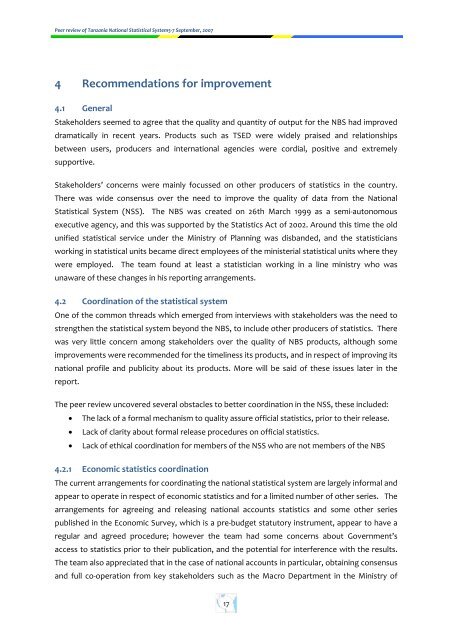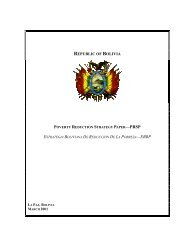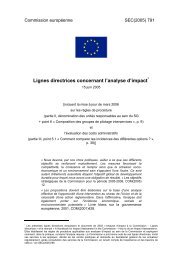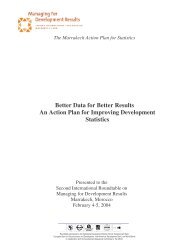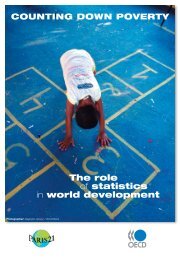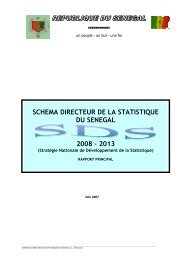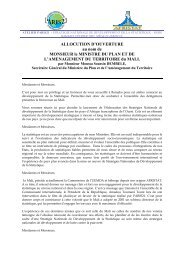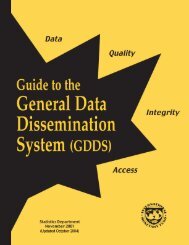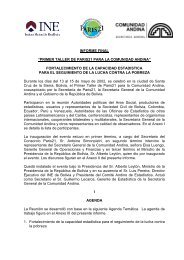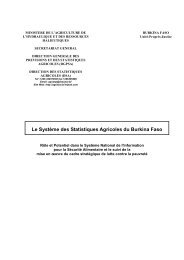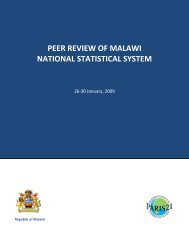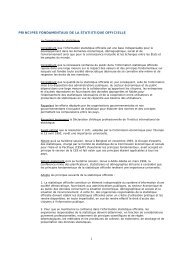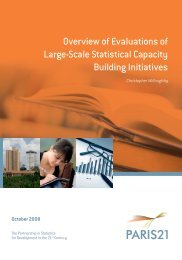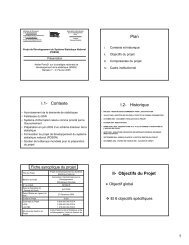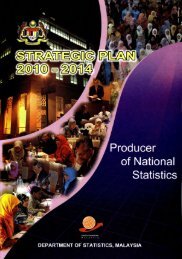Peer Review of Tanzania National Statistical System - Paris21
Peer Review of Tanzania National Statistical System - Paris21
Peer Review of Tanzania National Statistical System - Paris21
Create successful ePaper yourself
Turn your PDF publications into a flip-book with our unique Google optimized e-Paper software.
<strong>Peer</strong> review <strong>of</strong> <strong>Tanzania</strong> <strong>National</strong> <strong>Statistical</strong> <strong>System</strong>5‐7 September, 2007<br />
4 Recommendations for improvement<br />
4.1 General<br />
Stakeholders seemed to agree that the quality and quantity <strong>of</strong> output for the NBS had improved<br />
dramatically in recent years. Products such as TSED were widely praised and relationships<br />
between users, producers and international agencies were cordial, positive and extremely<br />
supportive.<br />
Stakeholders’ concerns were mainly focussed on other producers <strong>of</strong> statistics in the country.<br />
There was wide consensus over the need to improve the quality <strong>of</strong> data from the <strong>National</strong><br />
<strong>Statistical</strong> <strong>System</strong> (NSS). The NBS was created on 26th March 1999 as a semi‐autonomous<br />
executive agency, and this was supported by the Statistics Act <strong>of</strong> 2002. Around this time the old<br />
unified statistical service under the Ministry <strong>of</strong> Planning was disbanded, and the statisticians<br />
working in statistical units became direct employees <strong>of</strong> the ministerial statistical units where they<br />
were employed. The team found at least a statistician working in a line ministry who was<br />
unaware <strong>of</strong> these changes in his reporting arrangements.<br />
4.2 Coordination <strong>of</strong> the statistical system<br />
One <strong>of</strong> the common threads which emerged from interviews with stakeholders was the need to<br />
strengthen the statistical system beyond the NBS, to include other producers <strong>of</strong> statistics. There<br />
was very little concern among stakeholders over the quality <strong>of</strong> NBS products, although some<br />
improvements were recommended for the timeliness its products, and in respect <strong>of</strong> improving its<br />
national pr<strong>of</strong>ile and publicity about its products. More will be said <strong>of</strong> these issues later in the<br />
report.<br />
The peer review uncovered several obstacles to better coordination in the NSS, these included:<br />
• The lack <strong>of</strong> a formal mechanism to quality assure <strong>of</strong>ficial statistics, prior to their release.<br />
• Lack <strong>of</strong> clarity about formal release procedures on <strong>of</strong>ficial statistics.<br />
• Lack <strong>of</strong> ethical coordination for members <strong>of</strong> the NSS who are not members <strong>of</strong> the NBS<br />
4.2.1 Economic statistics coordination<br />
The current arrangements for coordinating the national statistical system are largely informal and<br />
appear to operate in respect <strong>of</strong> economic statistics and for a limited number <strong>of</strong> other series. The<br />
arrangements for agreeing and releasing national accounts statistics and some other series<br />
published in the Economic Survey, which is a pre‐budget statutory instrument, appear to have a<br />
regular and agreed procedure; however the team had some concerns about Government’s<br />
access to statistics prior to their publication, and the potential for interference with the results.<br />
The team also appreciated that in the case <strong>of</strong> national accounts in particular, obtaining consensus<br />
and full co‐operation from key stakeholders such as the Macro Department in the Ministry <strong>of</strong><br />
17


